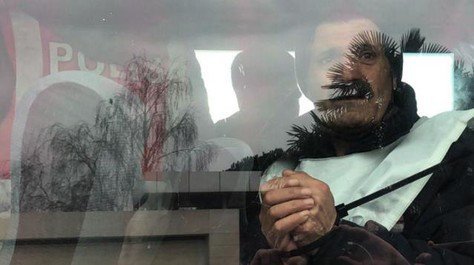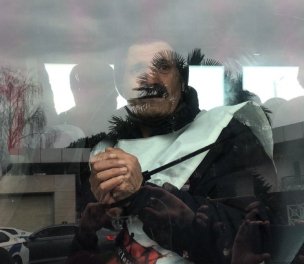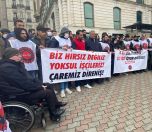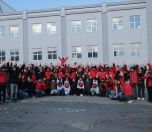Click to read the article in Turkish
Protesting for a wage increase and dismissed from the warehouse of Migros, one of the biggest supermarket chains in Turkey, workers' resistance has ended in their victory and they have celebrated it with folk dances in front of the warehouse in İstanbul's Esenyurt.
Their celebration today (February 21) was also joined by Peoples' Democratic Party (HDP) MPs Züleyha Gülüm and Musa Piroğlu and main opposition Republican People's Party (CHP) MP Ali Şeker.
Direnişten zafere: Migros işçilerinin eylemi halayla bitti https://t.co/iNlpZP92cr pic.twitter.com/bYp8MNm1XM
— bianet (@bianet_org) February 21, 2022
Mürsel Ünder, the lawyer of the Warehouse, Port, Dock and Maritime Workers Union (DGD-SEN), shared details about the agreement reached by the union and employers, Migros and Us Group.
Extending his thanks to everyone "who has acted reasonably and with common sense in this process and contributed to the current picture", lawyer Mürsel Ünder underlined that workers may have to pay heavy prices in Turkey in order to gain their rights.
"Our friends working here had to protest. They held protests such as halting work, occupying the workplace, stopping work. Because they had no other choice", he recalled, noting that "they were moved out of the workplace in a police attack and faced attempts of criminalization."
"As if what they did had been a grave crime, they were treated like criminals. But at the current stage, they have won," added the lawyer.
Reminding the press that the workers requested a 4-lira hourly wage increase and resolution of the problems concerning labor health and safety and the system of premiums, the lawyer recalled that "250 workers were dismissed instead of accepting these three requests".
Sharing details about the agreement, lawyer Ünder announced that their first request was the reinstatement of the dismissed workers and, at the meeting with the employer yesterday, it was said that the dismissed workers would be reinstated in their jobs. Defining it as "one of the most important gains", Mürsel Ünder added that an agreement has also been reached regarding the problems with the premium system. "What we have requested will be eliminated in the shortest possible time," he noted.
'We want elder brother Gülabi to come back, too'
On the other side, Migros Steering Committee Chair Ömer Özgür Tort attended a program on HaberTürk TV this morning.
Saying that 55 thousand people work in Migros, he indicated that 530 people are employed at the warehouse in İstanbul's Esenyurt.
Mentioning that Migros has 26 other distribution centers in a similar structure, Tort said, "We have reached a resolution by introducing a simpler premium system. The criteria for obtaining an increase in income have been made simpler. Let say: A system which was simple has become much simpler. It has been a solution which comprises everyone whose labor contracts have been terminated. We want all workers to come back."
He added, "We of course want elder brother Gülabi to come back, too; he has become a symbol, after all. They are all our personnel. This call had already been made the next day of the termination of labor contracts."

Detained in front of the house of employer Tuncay Özilhan on February 18 and wiping his eyes in the detention vehicle, Migros worker Gülabi Aksu's images sparked harsh criticisms on social media.
(HA/SD)













